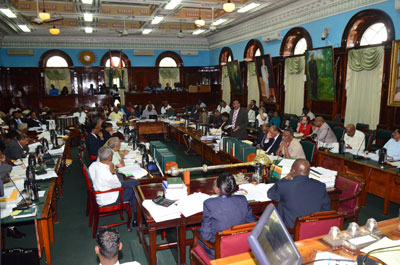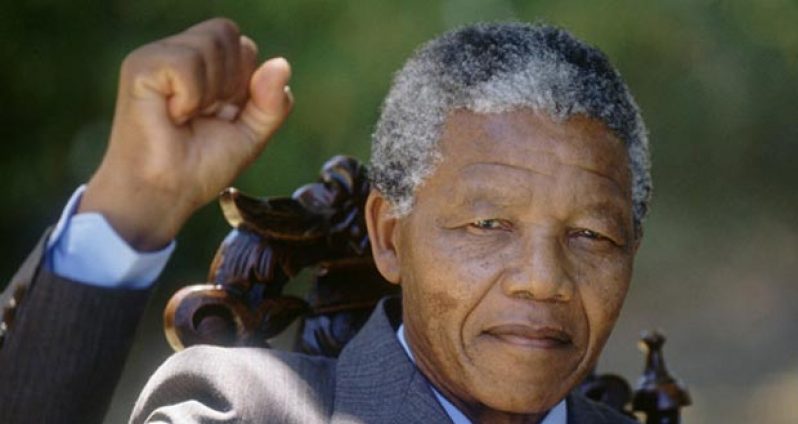– unanimously adopts Motion
A MOTION in tribute to late South African President, Nelson Rolihlahla Mandela was adopted in the National Assembly in the early morning of January 17, after several poignant speeches from members of all sides of the House. The Motion will be forwarded through the Ministry of Foreign Affairs, to the Government and people of South Africa.The first whereas clause of the Motion states that Guyana has long recognised Mandela as the genuine and legitimate leader of the South African people, a freedom fighter forced to support armed struggle after years of non-violent struggle against apartheid.
Mandela or ‘Madiba’ as he was fondly referred to as by his people became the symbol of the struggle for abolition of the system of Apartheid in South Africa.

Mover of the Motion and Leader of the House, Prime Minister Samuel Hinds said the Motion calls on the National Assembly and the Guyanese nation as a whole, to formally offer profound condolences to the Mandela family and to the Government and people of South Africa.
Mandela, who died at age 95, at his Johannesburg home on December 4, 2012, was an extraordinary man, worthy of all the adulation that flowed from all parts of the world, the Prime Minister said.
“Mandela earned the world’s tribute in the way he met, and in the way he created, many of the extraordinary circumstances of which he spoke…Mandela’s life, the events and his achievements had significance for people across the world,” the Prime Minister stated.
He added that the life story of Mandela provides both an example, as well as a challenge to Guyana, to overcome its own problems and the seeming impasse in which it find itself at the political level.
The Prime Minister’s Motion stated that from the early 1950s Guyana’s progressive forces, through the People’s Progressive Party and the People’s National Congress, were committed to principled and unwavering support for the African National Congress and the abolition of the system of apartheid, and the creation of a free, independent and democratic South Africa.
This was demonstrated significantly through Guyana’s contribution of US$50,000 annually for the African liberation struggle, as well as its agreement for the landing and refuelling of Cuban aircraft en route to support the Southern African liberation movement’s support for the international boycott of South African goods and sport, and Guyana’s severing of sporting contacts with apartheid South Africa.
APNU MP, Basil Williams said the struggles and sacrifices of Mandela are something that should be fully endorsed, and emulated by Guyanese.
“As a nation we must feel proud that we were able to effect such revolutionary changes in Southern Africa,” Williams said.
Meanwhile, Minister of Public Works, Robeson Benn, said that looking at the strides South Africa has made, there are now more reasons than ever to take heed in how Guyana is being developed as a young, thriving nation.
Speaking on behalf of the AFC, Moses Nagamootoo highlighted the need for the building of a multi-racial society and dealing with the root causes of all inequities. This, he said, are the principles which Mandela stood for.
Minister of Home Affairs, Clement Rohee spoke of the lessons that Guyanese could learn from Mandela, and a Motion that was tabled in the legislative council of Guyana in 1951 by the late Dr. Cheddi Jagan, calling on the council to denounce racial segregation in South Africa.
This, he said, shows the kind of character of the leader in those days, and said that this is being emulated by the 10th Parliament by way of this current Motion.
Meanwhile, Government’s Chief Whip, Gail Teixeira said the records would show the consistency and principled and progressive positions taken by successive Governments in Guyana in supporting South Africa to have Mandela released from prison and to end apartheid.
She explained that in the early years it was non-governmental bodies that took positions against apartheid, not governments, and this is why Guyana’s role in the 1950s is so significant because the country was still a colony.
“It was Guyana under the PPP and later under the PNC that paid the price for some of these progressive pro-liberation positions we took…we paid the price politically, the PPP was called communist, the PNC, socialist, we paid the price and we were looked at internationally by the Western powers up to the 1970s with tainted eyes…we paid the price as a people,” she explained.
(GINA)



.jpg)








